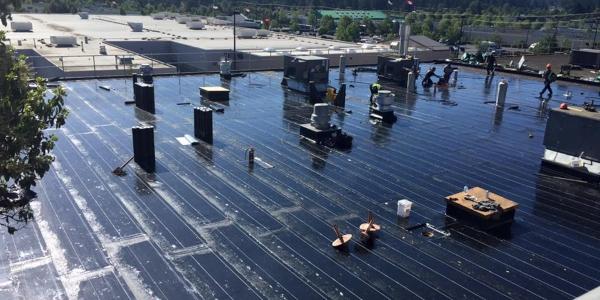Making the Jump From Residential to Commercial

By IKO.
How to smoothly break into commercial roofing, according to a contractor who has done it himself.
Breaking into commercial roofing as a residential contractor can be daunting, but you cannot deny the amazing opportunity it offers you as a contractor. It can be difficult to know where to begin as you move towards more commercial work, as there are differences between the two kinds of work that you may not have known. Luckily, IKO can offer the guidance you need to map out your transition successfully and smoothly.
IKO reached out to Richard Skujins, director of Cambie Roofing Contractors Ltd., to get his advice on becoming a commercial roofer. His business used to focus primarily on residential roofing. Now, he mainly sells commercial jobs and still pursues some residential work to fill up his schedule. Here’s how he made his transition successful and what you should know to plan your own journey.
Developing your education and skill in flat roofing
Residential roofers may not have much knowledge about the various flat-roof systems commonly installed on commercial buildings. Even if you personally know what you need to do the job, you’ll have to train at least a few team members to start out completing commercial work. The first step to getting your team this education is deciding which kinds of roofs you will install and repair for your commercial clients.
Which flat roofing systems should you offer?
Before you decide on one kind of flat roof, consider customer demands. Many commercial clients will already know which kind of roof they want before they even ask for quotes. Skujins often works with engineering firms, roof consultants and property managers who demand roofs of a certain type, within certain specifications and even with a specific warranty. While you may be able to offer advice to commercial clients about which roof is best for their circumstances, you may find that you more often need to meet their demands.
You can look into current commercial roofing jobs and see what roofing systems they are accepting quotes for. Also, consider what your competition offers. According to Roofing Contractor’s 2021 State of the Industry Report, 91% of commercial roofing companies offer installation of single-ply roofing materials. Here is a more specific breakdown by type:
-
TPO is offered by 38% of commercial roofers.
-
EPDM is offered by 30% of commercial roofers.
-
PVC is offered by 18% of commercial roofers.
Those that don’t offer single-ply membrane installation may work on commercial buildings with built-up roofing (BUR), modified bitumen roofing, shingle roofing or metal roofing instead. In fact, according to the same report, 68% of commercial roofing companies also offer shingle roof installations. It is possible to start out offering commercial work with just asphalt shingles.
You may also be curious about offering commercial green roofs. While rare, there is a growing market for these roofs.
Where should you learn flat roofing skills?
There are two main kinds of organizations that can help you get yourself and your team trained for the job. From using a propane torch for heat-welding to insulation needs, there is a lot to learn. Skujins recommends you work with roofing manufacturers and your local roofing organizations to get the education you need and find resources to help.
First, Skujins argues that choosing manufacturers and earning their certifications or completing their courses is essential. Not only can manufacturers tell you how to install their product best, completing their certification processes can allow you to offer better warranties. Many roofing jobs will specify the limited warranty they want, and offering top-notch limited warranties is important to compete with other commercial roofing companies.
It can also be highly beneficial to investigate membership with your local roofing organization. Skujins’ local association is the Roofing Contractors Association of British Columbia (RCABC). He says that the organization has been invaluable in growing his business. Most commercial roofers in a given area will know each other through these organizations.
You can find your local roofing organization on IKO’s roofer license resource page. Most organizations provide training and education that can help you learn more about flat roofing and about many other aspects of running a commercial roofing business. Your association with the local roofing chapter may also help instill trust in customers and therefore help you break into the industry. Some clients may even require that you be a member of your local organization in order to bid.
You can also rely on third-party training and licensing programs to train your existing staff to install and repair flat roofing. While training your staff may be time-consuming, the good news is that Skujins says residential roofers make great commercial roofers. In his experience, the time pressure of having to finish a home’s roof in one day is very motivating to his staff. Roofers who start under this time pressure and transition to commercial work tend to work faster.
Also, you can try to hire local roofers who already have commercial roofing experience. Roofing labor pools tend to be small in much of North America, and experience is therefore costly. In fact, according to Forbes, 90% of commercial roofing companies face increasing labor costs. However, having an experienced roofer may help you considerably.
As a commercial roofer, you will likely need to hire more staff to complete larger jobs in a timely manner. While the average residential contractor has fewer than 10 employees, the average commercial company has from 10 to 50, according to Forbes.
Insurance and licensing for commercial roofers
Before you send out a single bid, it is wise to make sure that your existing business can legally operate as a commercial roofing company and that you have the proper insurance to protect it in the event that something goes wrong. It is imperative to work with a lawyer to ensure your ducks are in a row before you begin.
Do you need a separate license for commercial roofing?
You may already be registered, licensed or certified for residential roofing work in your state or province. However, you may need to get additional qualifications to do commercial work. Again, you can find more information in our roofer’s license resource.
What kind of insurance do you need as a commercial roofer?
Skujins argues that having adequate insurance is the most important step to becoming a commercial roofer. You likely have general liability insurance as a residential roofer, but you will need to increase your coverage to account for the higher value of commercial buildings. While a residential roofer may have $1 or $2 million in general liability, a commercial roofing contractor may need $10 million or more. Your specific needs will depend on the scale and scope of the commercial projects you take on. It is important to ensure that your policy will cover commercial work. If not, you’ll need to arrange a new policy with your insurer.
Having worker’s compensation insurance is also critical. There may be new safety concerns that you must deal with as a commercial roofer, and it is important to protect your staff and your business from accidents.
Learn more about IKO Industries in their RoofersCoffeeShop® Directory or visit www.iko.com.
Original article source: IKO






















Comments
Leave a Reply
Have an account? Login to leave a comment!
Sign In